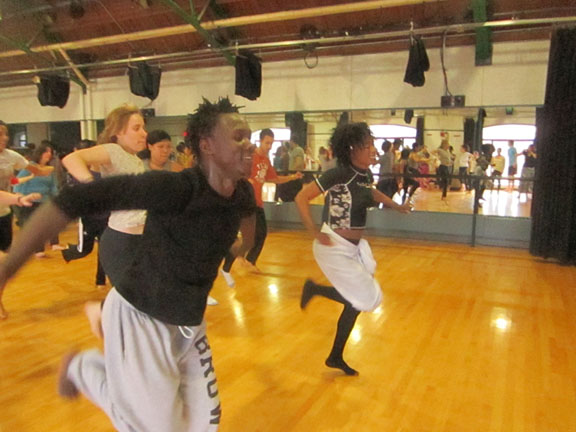PROVIDENCE, R.I. [Brown University] — When students in the New Works/World Traditions performance troupe take the stage for the Festival of Dance this week, their movements will bring to life a global collaboration that took place in the Department of Theatre Arts and Performance Studies (TAPS) this spring. Through the efforts of the Brown community on campus and beyond, internationally renowned choreographers from Mali, China, and New York have come together to create an original piece for the festival.
Michelle Bach-Coulibaly, senior lecturer in theatre, speech and dance, came up with the idea for the collaboration. Having traveled to Mali for more than 20 years to foster relationships between Brown art students and Malian artists, Bach-Coulibaly knows first-hand the strength of the arts in Mali.
“Mali is probably one of the most important countries in the world for importing other artists,” Bach-Coulibaly said. “It’s a great melting pot for styles, but what’s really important is that the arts are the place where Malians are the most proud, are the most empowered, have the most agency in the world, because everyone wants to learn from them.”

During her time in Mali, Bach-Coulibaly got to know Salimatou Soumare, a nationally recognized choreographer who has performed with several of the top dance troupes in the West African country. She invited Soumare and two other artists — Djibril Coulibaly and Alhassane Soumare, who worked with students in a TAPS West African-style dance class — to work as artists-in-residence in TAPS this spring.
Through Alison Friedman, a 2002 Brown graduate, Bach-Coulibaly met Gaoyan Jinzi, a founding member of the Beijing Modern Dance Company who is also an internationally celebrated choreographer.
Working with the Creative Arts Council and Year of China, Bach-Coulibaly recruited funding for all four artists to come to Brown and work together.
Sophia Shackleton, international spring residency coordinator for TAPS, led members of the Brown community in an effort to resolve visa problems for the Malian artists, including a Change.org petition and phone calls to the U.S. embassy.
Since graduating from Brown three years ago, Shackleton has been traveling back and forth to Mali to facilitate artist collaborations with Brown students through an organization co-founded by Bach-Coulibaly called the Yeredon Center for the Malian Arts. Fluent in the native Malian language of Bambara, Shackleton acted as a guide and translator for the Malian artists during their stay in the United States.
All four artists arrived in early March and worked together until Jinzi returned to China on March 24. They performed and taught workshops at the Rhythm of Change Festival before starting work on the Festival of Dance piece.
Salimatou and Jinzi, with Bach-Coulibaly and Brian Reeder, choreographer for the American Ballet Theatre in New York, each devised a part of the final piece. Their styles are decidedly different, each informed by culture and experience, but there are underlying themes of cross-cultural understanding, global hunger, gender, and materialism woven throughout the piece. All of the choreographers worked with the student performers to derive those themes. Jinzi, for example, started by asking students, “If today was the end of the world, what would you do?” Similarly, Bach-Coulibaly and Reeder posed the question “What matters to you?”
“There are many, many links between these three countries, socioeconomically, sociopolitically, but through the creative arts we can let that go and break through those conversations and say something about our humanity, our treatment, our philosophies, and spirituality, and what our sameness is,” Bach-Coulibaly said.
This is Salimatou’s first visit to the United States. Although Jinzi has been here several times before touring with her company, she had never before visited an American university. When asked, through their translators, what the experience of coming to Brown has been like, both commented on how impressed they are with the motivation of the students.
“The students are so eager to learn. They are so busy but always try their best to come to rehearsal. They are full of energy and imagination. It’s a very open, good place to create. No one ever says, ‘Don’t do that,’” Jinzi said.
By the time the New Works/World Traditions performance troupe takes the stage May 3, the artists will have returned home. But the lessons they leave behind transcend the choreography they created for the students, according to Shackleton.
“Love is not only a theme that they’ve used to create the piece but it’s also about students learning that you can have love and caring for somebody across a language barrier. By having them here dancing, they don’t need talking all the time. To encounter people from China and Africa that they can care for without having to talk to them, is sort of a theme that is resonating under everything that is going on.”

